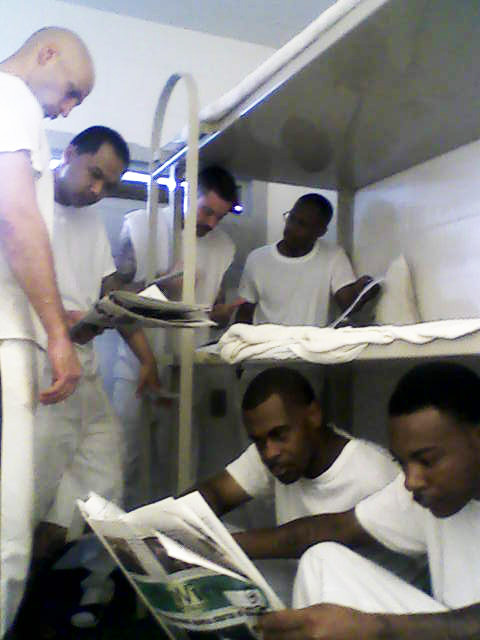
by Morgan Saltz | Sep 16, 2020 | Feature, General, News, The Arts
San Francisco, CA. Based on the historical Haight Street of San Francisco with another volunteer center in Berkeley, Prisoners Literature Project has delivered packages of literary material to prisoners for over 30 years. Unfortunately, the outbreak of COVID-19 has hindered both the organization to provide books to inmates as well as the prisoner’s ability to participate. While still sending out hundreds of packages per month, that amount is nowhere near the previous volume Prisoners Literature Project (PLP) was able to distribute.
PLP relies solely on volunteers to package and mail specific books, however social distancing guidelines in response to the pandemic have prohibited the organization to continue their normal volunteer operations. Simon Carless, a volunteer and social media advocate for PLP, emphasizes the organization’s total reliance on volunteers and donations; “Nobody is being paid by the organization, so for us, it’s important that all the money we receive goes directly to helping prisoners.”
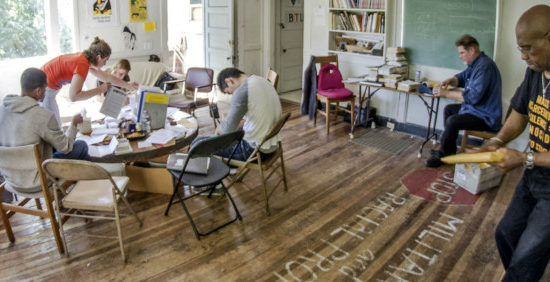
Volunteers such as those pictured are no longer able to gather and pack or distribute literature in The Grassroots House due to COVID. PLP hopes to return to their normal volunteer-based practice soon.
Partnerships with other nonprofit organizations further allow PLP to provide prisoners with a diverse collection of literature. Grassroots House is the parent organization to PLP, and Carless describes the nonprofit as a “collectively run physical space”. Grassroots activism allows increased diversity among both literature donations and volunteer demographics; “We do have a whole bunch of backgrounds, jobs, and ages, yes. I think everyone has a different view on why they are doing this and how they can help – so as a collective we try to self-organize so that everyone is doing what they want to do to make things better.”
PLP is also partnered with the Prisoner Activist Resource Center and includes the organization’s brochures within their literature packages to provide prisoners with information regarding resources and fundamental business knowledge. In addition to the education and resources prisoners receive through the PLP, Carless is proud of the more spiritual and therapeutic ameliorates their organization provides as well. “Many prisoners request dictionaries and thesauruses, so for them, their literacy is important….But in general, when they are in such isolation or have such poor access to reading materials, a great result is an improved state of mind and the feeling that somebody is looking out for them. We hope!”
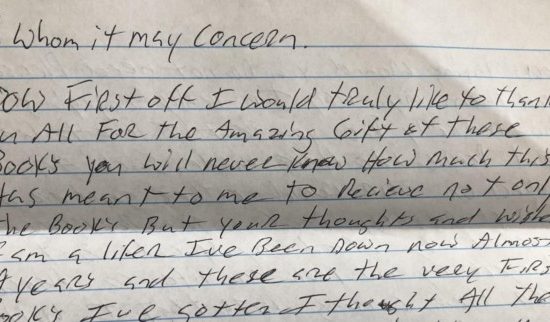
Carless highlights the organization’s appreciation for the letters of thanks PLP receives from prisoners due to their work.
While COVID has hindered their operation, Prisoners Literature Project continues to accept donations and hopes that both their dedicated volunteers as well as the prisoners who have had their resources restricted due to the pandemic can once again engage in the efforts of the organization. Carless acknowledges the immense impact of COVID on PLP; “Many prisons are in lockdown or partial lockdown and have been very badly affected by COVID, which is very sad. And PLP itself has had to stop doing group volunteer sessions, which has majorly affected our ability to send out packages. (We are still sending out hundreds per month, just not as many as we did.) We hope to get back to normal soon, but it’s difficult for everyone concerned.”
https://www.prisonlit.org/
From Prisoners Literature Project
The Prisoners Literature Project is an all-volunteer, non-profit group that sends free books directly to prisoners who request them from throughout the United States. Working almost continuously for thirty years, our U.S. prison books program has gotten (literally) tons of books into the American prison system, while staying overwhelmingly ‘grassroots’ – no full-time employees, no overhead eating up your donations.
Partnerships
Prisoner Activist Resource Center – https://www.prisonactivist.org/
The Grassroots House – https://grassrootshouse.org/

by Morgan Saltz | Aug 23, 2020 | Feature, General, News
Oakland, CA. As the world adjusts to the pandemic, Wardrobe For Opportunity has had to close its office and create virtual programs to continue its mission to assist low-income individuals, people of color, and immigrants with not only job placement, but skills in long term career development. The organization provides several empowering programs to aid clients in professional visual appearance, job placement, long-term career development, and education in financial literacy. The impact of COVID has expanded Wardrobe for Opportunity’s clients, as many have lost employment and are in need of career services.
Founded in 1995, Wardrobe for Opportunity (WFO) began as a service for low-income women to receive professional attire but has since greatly expanded its programs to include all gender identities. Executive Director Hannah Quan identifies a program called Navigate as one of the organization’s most successful programs. “Last year we saw twice as many people graduate from the program as we expected, and this year we are on track to double that number again. The program is intended for people who are unemployed and looking for work, and we are now hearing from people who never expected to find themselves in this situation due to COVID-19.” The program offers training not only for those newly entering the job search but the program now services an entirely new demographic. Navigate also partners with organizations such as Beyond the Gates and Center for Employment Opportunities which work with both adults and youth reentering the population from incarceration. Quan says for some of these men and women, the Professional Attire Service is the first step and is one of the most personally rewarding to see. “The styling appointment is often the first time they see themselves as capable and deserving of a professional career.”

Racial and social injustice is also a focus of WFO and the nonprofit advocates for those causes. Though not a public advocacy organization, Quan explains how WFO works to fight injustice and inequality in the workplace in other ways; “When it comes to equal pay for equal work, we know that black, indigenous and people of color (BIPOC) by and large earn less than their white counterparts, and our client base is reflective of that inequality. Our programming covers ways that clients can advocate for themselves in the workplace, whether it be for higher pay, a better job title, increased benefits, or better overall treatment.”

Graduates from Wardrobe For Opportunity’s Catapult Program, focusing on long-term career planning and economic self-sufficiency.
The pandemic has left many without employment and Wardrobe for Opportunity has tirelessly worked on online strategies to continue to provide support and education for clients. Staffers serve the Bay Area community with not only professional attire to be visually prepared for the job search, but they go beyond job placement to build careers, self-confidence, and stability. As it celebrates its 25 years in service, Wardrobe For Opportunity will not allow COVID to stand in the way of its mission.
From Wardrobe For Opportunity:
We acknowledge the shifting demographics and increasing cost of living in the Bay Area and provide workable strategies to the low-income residents that remain. WFO’s strategic plan addresses the needs of low-income clients to succeed in building a life that is sustainable for their future. I hope you will join and support us as we transform lives throughout the Bay Area.
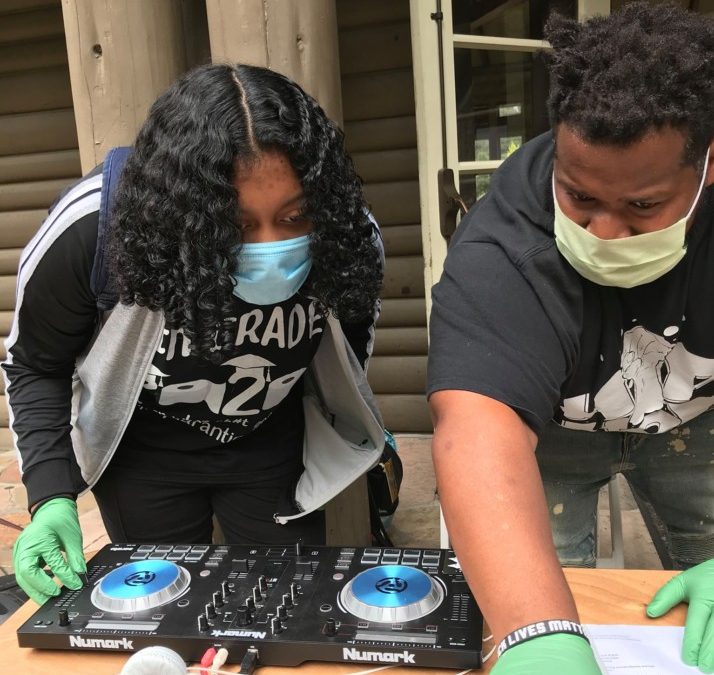
by Morgan Saltz | Aug 10, 2020 | Coming Up, General, News, The Arts
Oakland, CA. The beat goes on at Hip Hop for Change during the COVID-19 pandemic. Marlon Richardson, (above) is a Hip Hop educator who finds ways to continue working with marginalized youth and adults. While the historic Black Lives Matter (BLM) protests in the wake of George Floyd’s death are heightening awareness about racial and social injustice, artistic expression in the form of Hip Hop music has long been an outlet to critique unjust power relations. The emergence of Hip Hop culture in the 1980s impacted both social progress and individual growth. It was also the foundation for the nonprofit organization, Hip Hop for Change.
Founded in 2013, Hip Hop for Change offers programs to educate, support, and inspire both the youth and adults of Oakland. Executive Director Khafre Jay emphasizes the importance of working with urban youth who are dealing with discrimination and violence as a part of their everyday lives. Hip Hop for Change has implemented THE MC Program (Theory of Hip Hop Evolution, Music, and Culture) and has expanded the program to connect the youth to artist-educators who are trained to mentor and motivate young artists in the pursuit of their artistic aspirations. The program is not only for the youth; the artist-educators benefit from the training and employment provided by Hip Hop for Change. Khafre Jay emphasizes the impact of the program; “Since its inception, THE MC Program has touched the lives of over twenty thousand K-12 students, employed and trained dozens of local artist-educators, and half of our programming has provided for free to underserved youth. This program alone is one of the best reasons to support our organization’s work.” Not only the Executive Director for Hip Hop for Change but an established Oakland hip hop artist, the mission resonates personally for Khafre Jay; “Hip Hop is a very empowering culture. It provides an expressive space for youth of color as well as a constant pull towards self-affirmation, and ideas of self-esteem, and self-efficacy. For a lot of POC youth, the first time they find themselves experimenting with self-worth is through Hip Hop expression, and I was no different growing up.”
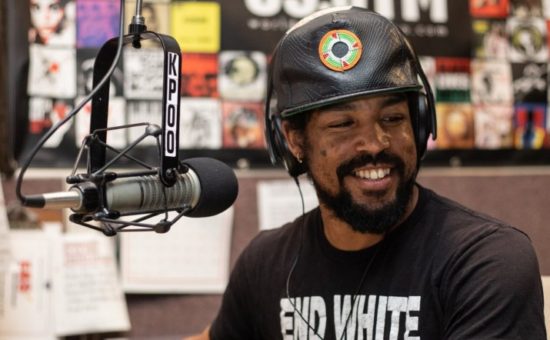
Executive Director Khafre Jay also holds a radio show on KPOO and is founded by Poor People’s Radio. The mission is to bring public news to the “disenfranchised and underserved”.
Grassroots activism has been intrinsic to Hip Hop for Change. Khafre Jay explains that “grassroots activism allows us not to have to code-switch as an organization.” He explains that a nonprofit such as his, which is Black-led and culturally focused, is not valued by the predominantly homogeneous decision-makers of white males that can provide funding. Therefore, receiving funding is difficult. However, Hip Hop for Change has had success through the Grassroots Jobs Program that not only spreads its mission statement to the community but provides employment, education, employee development, and connects their employees with community activism. As Khafre Jay explains; “Grassroots activism allows us to create hundreds of jobs and employ people in our village while engaging and informing the public about race and social justice. We couldn’t be as effective as Black and Brown people in this country without grassroots tactics.”

Employees for the Grassroots Jobs Program who are dedicated to fighting racial and social injustice
The Grassroots Jobs Program has suffered from the global pandemic as Hip Hop for Change was forced to furlough employees, and further setbacks came as school contracts ended due to COVID. Yet Hip Hop for Change continues to create ways to bolster their community. The organization is transitioning to online educational programs and creating new services such as free music production to youth under 25. In spite of the current global crisis, Hip Hop for Change is dedicated to social and racial activism, educating the youth on the history and significance of hip hop culture, providing resources for aspiring artists, and developing employment opportunities for the people of Oakland.
From HipHopForChange:
HipHopForChange seeks to address injustices of representation through education, community building, and the creation of a platform for people who identify with Hip Hop culture to express their true voices, selves, and culture. We create a space that emphasizes and encourages the root values of Hip Hop culture: peace, love, unity, and having fun.
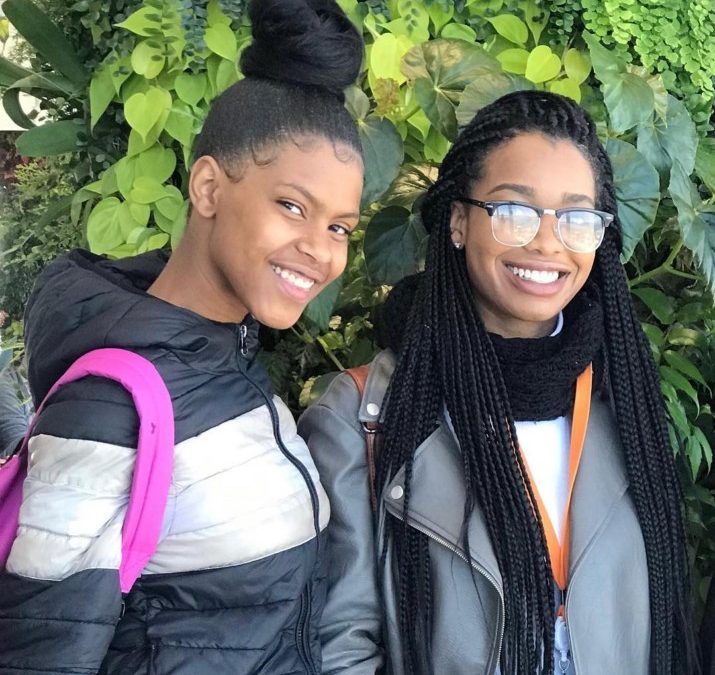
by Morgan Saltz | Jul 25, 2020 | Coming Up, Feature, General, Lifestyle, News
Oakland, CA. It started out as a personal mission to inspire spirituality throughout her neighborhood for Jasmine Taylor (pictured above on the right). She launched the “Stepping Out on Faith” prayer walk in October of 2014 and that led to her founding a nonprofit called 1C13 Productions.
The strategy of continuing 1C13 Productions, especially with the youth, during the COVID-19 pandemic is an ongoing discussion within the organization according to Taylor. Because the nonprofit works extensively with youth through direct interaction within school settings, COVID 19 has halted its programs. However, 1C13 remains dedicated to creating and offering programs that allow interaction with the students while adhering to social distancing mandates.
Services within the organization include youth outreach, community events, feeding the poor, and providing resources for Oakland families to fight poverty and enrich their children’s future through The Legacy Program.
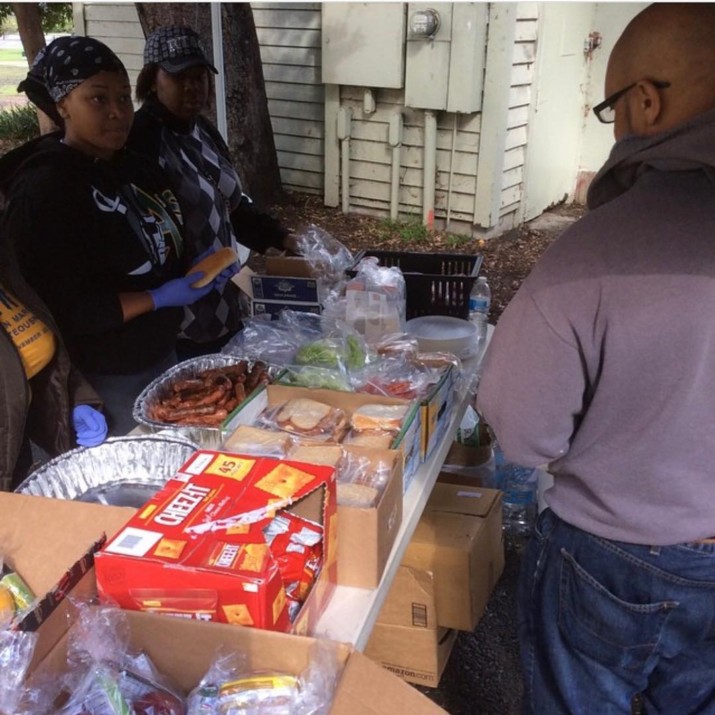
One goal of 1C13 Productions is to eradicate hunger in urban communities. Given the effects of poverty and gentrification, many men, women, and children in urban communities face hunger daily. The nonprofit regularly feeds the homeless and is planning on expanding these efforts.
While initially focused on community programs,1C13 provides several programs for the youth of Oakland to acquire the skills which will bolster their confidence and create positive opportunities. The Walking in Royalty program exposes youth to many different disciplines of study and career opportunities to encourage the young people of Oakland to recognize their full potential and ensures a well-rounded exposure to different career possibilities.
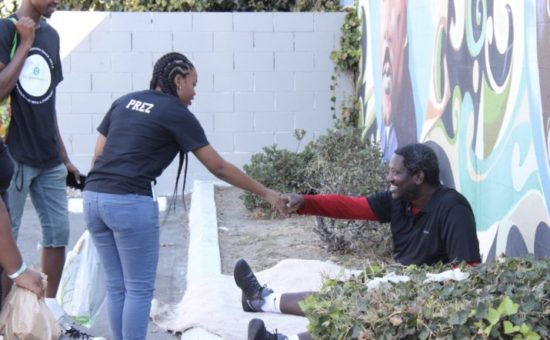
Occasionally working directly with schools to provide life skills classes for both the youth and families through the Walking in Royalty programs, 1C13 also offers these programs to the public through the King/Queen Connections program. Taylor, who also holds the position of Restorative Bridge Maker at Frick United School of language to diffuse conflicts between students, describes her work with the youth as “the most gratifying” and a “beautiful and humbling opportunity”. The testimonies given from some 1C13 youth confirms their reciprocal admiration for the program and their mission; “(The Life Skills) class has changed me in many ways. It’s encouraged me to never give up. It taught me to be a young lady. It taught me to never let what other people say affect my future and who I want to be.” – Mia C., 8th grade.
From 1C13 Productions:
1C13 Productions Inc. is a pillar in the community and has created a lasting impact on youth, communities, and families throughout its 5-year tenure in the Bay Area and in its schools. Here are testimonials from some of those we’ve had the opportunity to work with.
“Jasmine Taylor has the best job in the world: empowering young kings and queens of East Oakland to live their truth and nurture their brilliance. As a teacher and trauma-informed student mentor at Frick Impact Academy, “Ms. Taylor” heals interpersonal harm through her expertise in Restorative Practices and leads students in deconstructing the forces of oppression in their lives and communities as they foster resilience, confidence, and integrity.”















